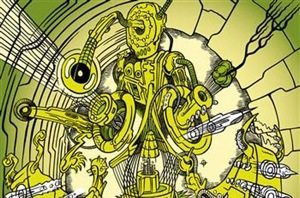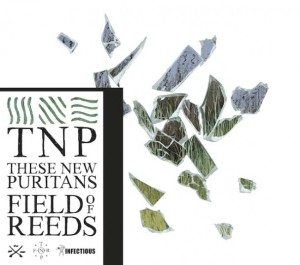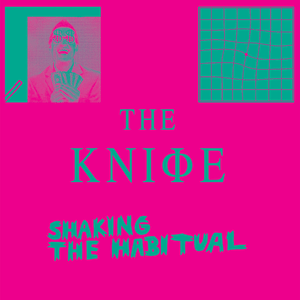Fennesz: Bécs
Similar Artists: Eluvium, William Basinski, Steve Roach, Brian Eno
Genre: Isolation, Solitude, Anesthetics
Label: Editions Mego
90% of the time that I’m listening to ambient music, or new age, or any kind of soothing instrumental music for that matter, I’m unconscious — lost in some empty space where only faint remnants of the music can actually reach me. It’s those faint glimmers of warmth that provide a cushion for my dream world though, and they form a rather heavenly landscape for my mind to sanctify in. It’s a means of therapy above all else, as it keeps me in a state of floatation during the nights, and away from any unrelenting demon lurking in my mind who’s seeking for a way in during my weakened state. But as much as this music does provide a sort of safe haven for my mind and is greatly therapeutic, it simultaneously keeps me away from the reality of things, each lulling wave and static frequency pushes me down beneath the surface and into a realm of nothingness. It’s a predicament that I’ve become torn by: do I let myself become haunted by painful memories, or do I live in a fantasy world that eventually leads nowhere? If only I could relieve myself of this ancient fear I possess — one of the afterlife, of death, of suffering — then maybe my mind wouldn’t be such an awful place to succumb to.
Fennesz is an artist who I’ve been living with — both consciously and unconsciously — for quite some time. Endless Summer, his 2001 breakthrough and certifiable electronic classic, ushered me into a new phase of music appreciation. Where it was not uncommon for abstract electronic artists from the time to conjoin disparate genres (in this case, sunshiny, heavily processed guitar and sharp, layered noise), Fennesz was able to make each genre melt into the other, and not in a shoegaze type of way (although that is a noticeable influence as well), but in a way where sounds which would be described as harsh and ugly in isolation actually emanated a resounding calm, and made you re-think the meaning of the word “beautiful”.
Bécs is the apparent sequel to Endless Summer, and since it’s the artist’s first solo long player since 2008’s shade or two darker Black Sea, it’s quite the reason for excitement from an ambient aficionado like myself… Or maybe it’s not, because there has been no real shortage of Fennesz-like music in the past 6 years anyway. Matthew Cooper, whose Eluvium alias gained comparison to Fennesz, and was even hailed as “the American Fennesz” at the start of his career, has released a plentiful amount of serene and intricate soundscapes in that timeframe (including last year’s excellent double album Nightmare Ending); not to mention Christian Fennesz himself has released multiple collaborative albums (often more than one per year), so its hard to say he has truly been missed. Also, it’s not as if the appeal/novelty of his earlier works has worn dry, as I still revisit the likes of Endless Summer frequently, so calling this a sequel which draws from the same sound palette doesn’t do much to further any excitement. Or maybe my slight hesitation in approaching this record stems from being afraid of what extensive listening to this music will continue to do to me, or rather, what it will prevent me from doing in the long term. Do I really need to hide away from the surface anymore? Haven’t I hidden from my anxieties for long enough?
The first thing one notices when listening to Fennesz is how beautiful and intricate and detailed the sounds are, and how they form a mystical, yet never contrived or predictable world. After that feeling has worn off, however, they notice that the feeling it prescribes is truly one of emptiness. This is a strange word for me to use, as Fennesz is an artist I am continually intrigued and fascinated by, but it is not emptiness by way of loneliness that I intend to speak of, but instead emptiness by way of numbingness, and a lack of awareness for the outside world. It is music to initiate the drifting mind; a solitary stoner’s paradise that thrives on antisocial behavior and eventually, a loss of love.
It’s worth mentioning that Bécs does all of this gorgeously, even if it is exactly what one would have expected it to be. Through the 40 or so minute runtime our ears are treated to heavenly guitar strums shrouded in elegant cinematic hues, bright tones and crumbling static that slowly massages the listener into a state of empty bliss. And the thing is, each track does do this in a wholly different way, quite expertly in fact. There is no simple trick at play here, and it’s one of the reasons repeated listens don’t do much to reveal the fogginess of these compositions. Fennesz can use sounds that in isolation are eerie, mournful, perplexing, or even terrifying, but when lumped together they transform into a collage of carefully treated beauty that is as grand to listen to as it is hopeless to live by.
I don’t know exactly what I’m getting at with this review, and it’s because I’m at the crossroads in terms of my musical identity. This is my first review in over 4 months, and while part of my absence has been because I’ve been terribly busy with both work and school, and another has been because of a little something called Dark Souls 2, mostly, it’s because looking at art objectively is not something I feel is possible for me anymore, as my opinion and its meaning changes from day-to-day, listen-to-listen. This means that I didn’t have the chance to write reviews on some of this year’s most notable releases, of which there have been many — including The Body, tUnE-yArDs, Wild Beasts, and The War On Drugs to name a few — but that’s ok, because I’m not sure how I feel about any of them anyway. I’ve expressed this concern before, but I’m now more than ever in speculation about the point of a critic in today’s flooded musical landscape where countless music is released daily that will seldom he heard by but a few ears. What I do know, is that music is not something that can be experienced in isolation from the rest of the world. Contrary to my previous beliefs, music — no matter how original or well-written or well-produced — cannot last without contexts (friends, families, locations, real-world scenarios) and for that reason, it unfortunately cannot be solely listened to on headphones to and from your way to work. It is an element that must be consumed fully and discussed in detail with a range of real life people at concerts, festivals, and bars — not just through nameless online entities. Like myself, music is also in a bit of an existential crisis, trying desperately to adapt to its new set of criteria without outwardly admitting to it. It will survive, undoubtedly, but for now we’re both lost in a sea of information, trying to claw ourselves out and numb the pain with anesthetics all at the same time.
Track Listing:
1.) Static Kings*
2.) The Liar
3.) Liminality*
4.) Pallas Athene
5.) Becs*
6.) Sav
7.) Paroles*
Album Highlight: *































